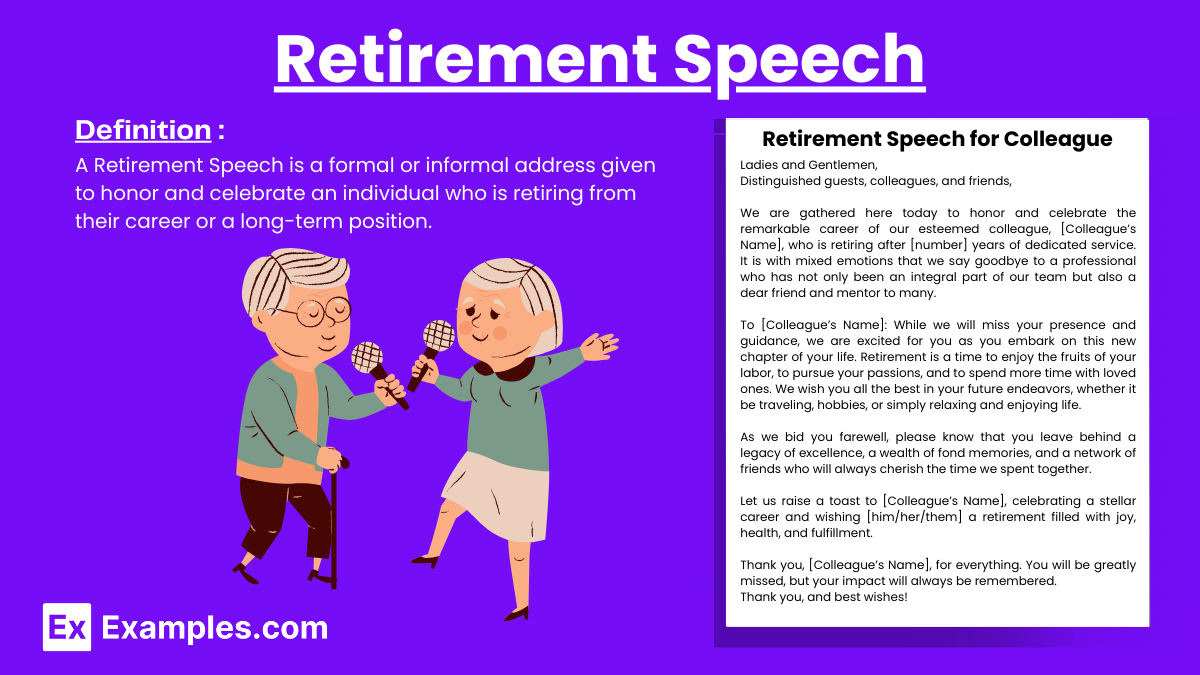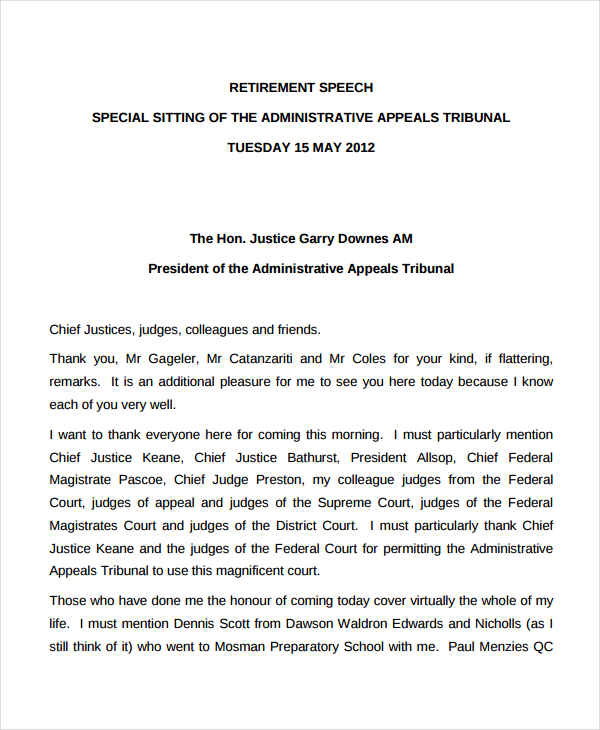32+ Retirement Speech Examples
It is an undeniable truth that each and everyone of us will have our time to part ways. A concrete example of this situation is a retirement. And when you retire, a speech could be inevitable. Just like a keynote speech, your retirement speech should contain revelations of some of the most important moments of your life.
If you are confident with the way you write, you can personally draft your own retirement speech. If not, a speech writer can do the work for you. However, we have compiled some samples of introduction speech for you to have a better understanding on how to write one.
What is Retirement Speech?
A Retirement Speech is a formal or informal address given to honor and celebrate an individual who is retiring from their career or a long-term position. This speech is typically delivered during a retirement party, ceremony, or farewell event and serves to acknowledge the retiree’s contributions, achievements, and impact over the course of their career. It is also an opportunity to express gratitude, share fond memories, and offer well-wishes for the retiree’s future.
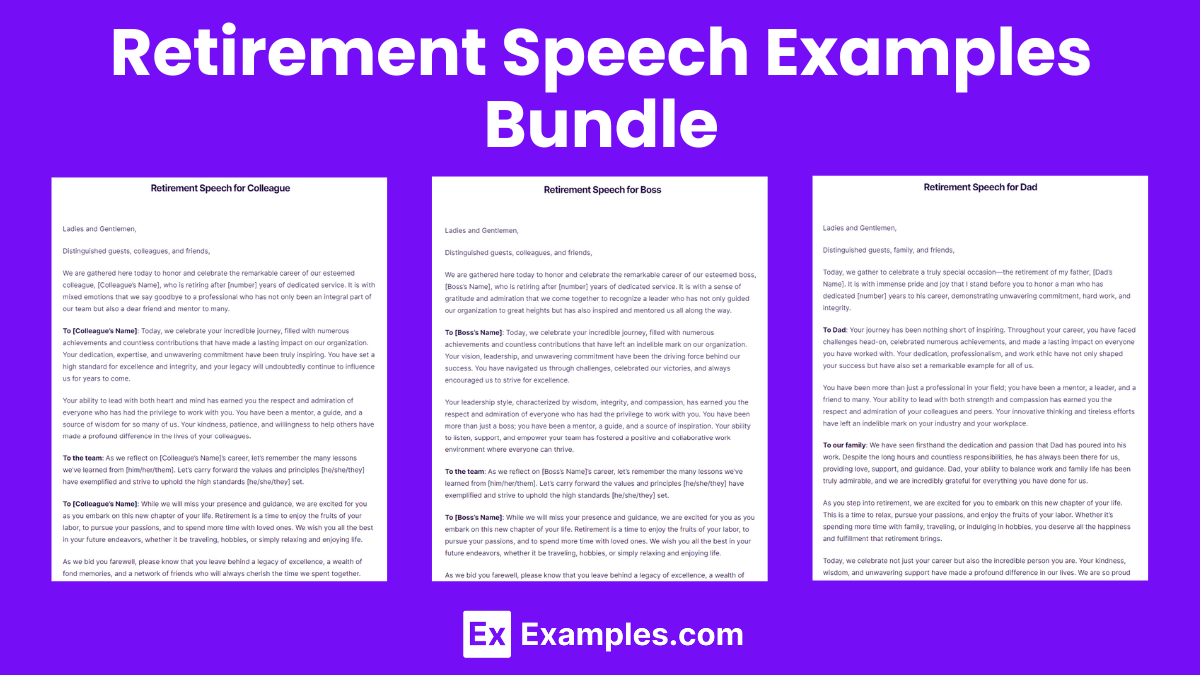
Retirement Speech Bundle Download
Retirement Speech Format
Introduction
Greet the audience
Briefly introduce yourself (if necessary)
Opening Remarks
Express gratitude for the opportunity to speak
Acknowledge the significance of the occasion
Career Highlights
Briefly summarize your career journey
Mention key achievements and milestones
Highlight memorable experiences and moments
Acknowledgments
Thank your colleagues, mentors, and supporters
Recognize specific individuals who have made a significant impact
Personal Reflections
Share personal thoughts and feelings about your career
Discuss how your work has influenced your life and values
Reflect on the lessons learned and personal growth
Closing Remarks
Express gratitude one final time
Offer well wishes to colleagues and the organization
End with a memorable quote, anecdote, or a simple heartfelt goodbye
Retirement Speech Example
Short Retirement Speech Example
Retirement Speech for Colleague
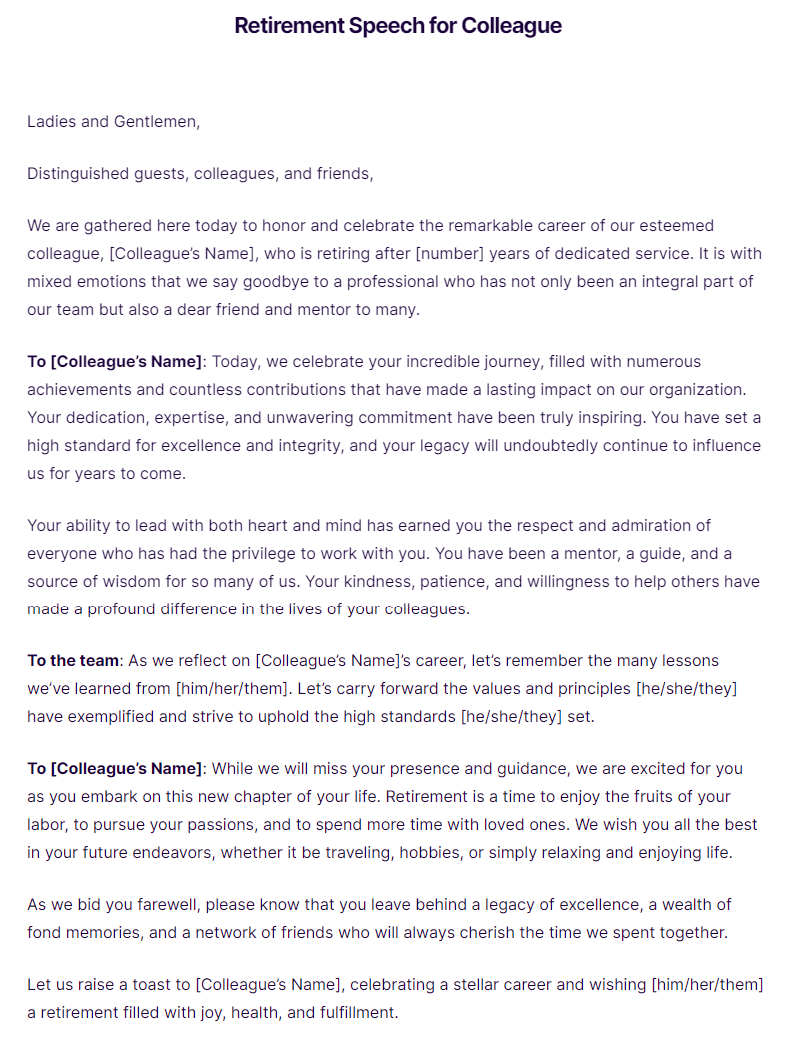
Retirement Speech for Boss
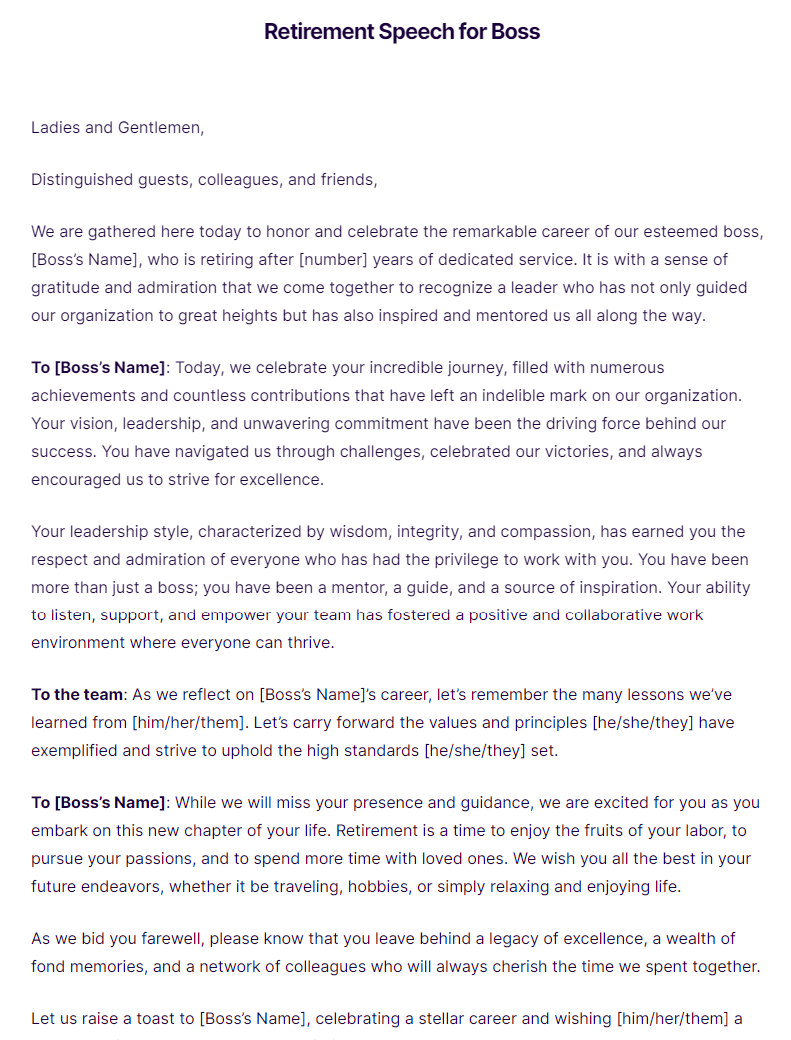
Retirement Speech for Dad
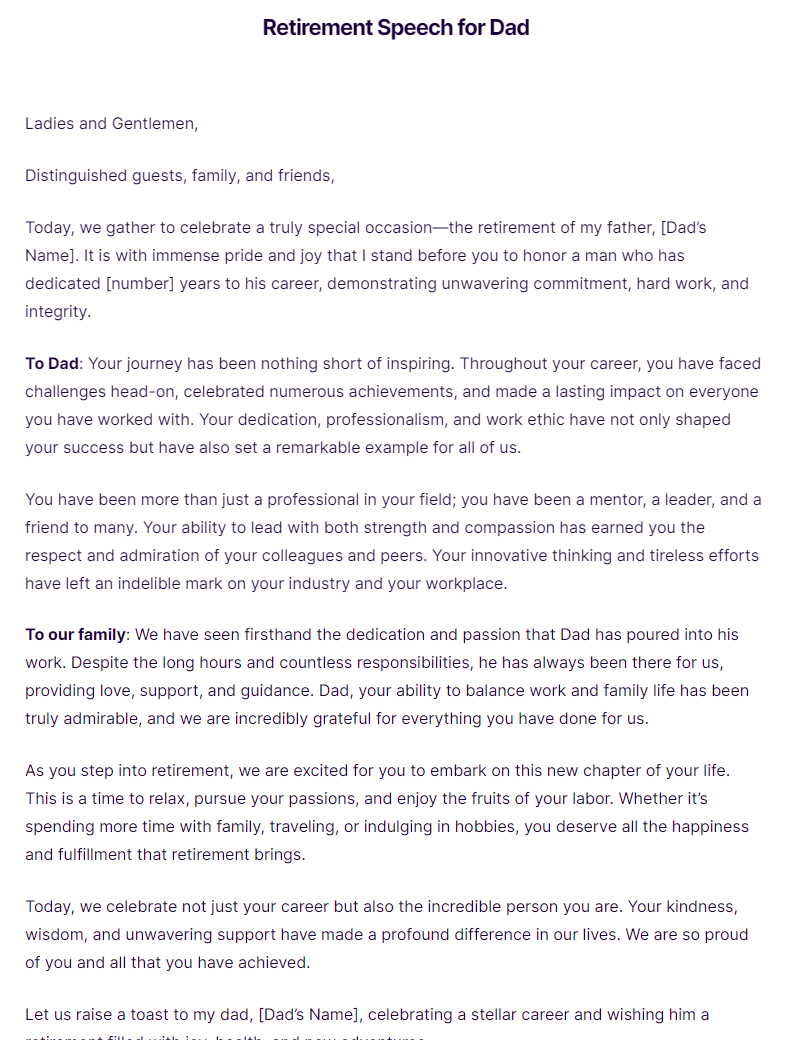
More Retirement Speech Topics
- Retirement Speech by Retiree
- Retirement Speech for Teacher
- Retirement Speech for Employee
- Retirement Speech for Friend
- Retirement Speech for Family Member
- Retirement Speech for Mom
- Retirement Speech for Mentor
- Retirement Speech for for CEO
- Retirement Speech for Manager
- Retirement Speech for Police Officer
- Retirement Speech for Military Officer
- Retirement Speech for Scientist
- Retirement Speech for Accountant
- Retirement Speech for Firefighter
- Retirement Speech for Lawyer
- Retirement Speech for Judge
- Retirement Speech for Entrepreneur
- Retirement Speech for HR Manager
- Retirement Speech for Architect
- Retirement Speech for Principal
- Retirement Speech for Musician
- Retirement Speech for Writer
- Retirement Speech for Professor
- Retirement Speech for Coach
- Retirement Speech for Cricketer
- Retirement Speech for Chef
- Retirement Speech for Pilot
Administrative Retirement
How to Write Retirement Speech
1. Introduction
Begin with a warm greeting. Mention the retiree’s name and express your gratitude for being part of this special occasion.
Example: “Good afternoon everyone. It is an honor to stand here today to celebrate the remarkable career of [Retiree’s Name].”
2. Highlight Career Achievements
Summarize the retiree’s major accomplishments and contributions to the organization. Mention any awards, promotions, or significant projects they were involved in.
- Example: “During their [number] years with us, [Retiree’s Name] has been instrumental in [specific achievement], and their dedication has earned them [specific award or recognition].”
3. Personal Anecdotes
Share a few memorable stories or personal experiences with the retiree. These anecdotes should reflect their character, work ethic, and impact on others.
Example: “I will never forget the time when [Retiree’s Name] stayed late to help me with a critical project. Their willingness to support their colleagues is truly admirable.”
4. Acknowledge Relationships
Recognize the retiree’s relationships with colleagues, supervisors, and subordinates. Highlight the positive influence they have had on the workplace culture.
Example: “[Retiree’s Name] has always been a mentor and friend to many of us. Their guidance and kindness have made our workplace feel like a second home.”
5. Express Gratitude
Thank the retiree for their hard work and dedication. Mention how their presence will be missed and how they have left a lasting legacy.
Example: “Thank you, [Retiree’s Name], for your unwavering commitment and the positive impact you have made. Your legacy will continue to inspire us.”
6. Well Wishes for the Future
Conclude with well wishes for their retirement. Mention any known plans or hobbies they might be looking forward to.
Example: “As you embark on this new chapter, we wish you all the best in your retirement. May you enjoy your time traveling, gardening, and spending time with loved ones.”
7. Closing
End with a final note of appreciation and invite the audience to join you in celebrating the retiree.
Example: “Let’s raise a toast to [Retiree’s Name] and their incredible journey. Thank you for everything, and congratulations on your retirement!”
What to Write in a Retirement Speech
There are certain rules to follow when writing a speech.
Though most speeches require the basic structures like the introduction, the body, and the conclusion speech, a personal touch is probably the most important part. The speech has to reflect a person’s character in the way that the words are arranged and the language used to convey the meaning.
In addition to that, a retirement speech should at least narrate a short story of an unforgettable moment that may have changed the your life.
Lastly, since it is a farewell address, it should have words of gratitude to the people who have been a part of the journey.
Importance of Retirement Speech
On retirement, you have so much experience to share and stories to tell. A retirement speech in pdf is also considered by some as an opportunity to thank their colleagues and everyone who has contributed to their growth as a person and as an employee.
Some even use retirement speech template to impart lessons in life, lessons they have learned for all those years of hard work and dedication. Others wold even say jokes as a way of telling people that it has been a wonderful journey and that their retirement is just another step towards a new beginning.
Why Do You Need a Retirement Speech?
Writing a speech takes a lot of time and effort specially if you are not used to doing it. However, it is never a standard to write a grandiose speech outline. The most important thing is you get to say what you want to say.
Most employees who end their professional careers after a considerable period of time prefer to have their retirement speeches. Not that they want to be recognized by everybody but to say their words of appreciation and indebtedness to the company.
Tips on Preparing Retirement Speech
Your retirement speech doesn’t have to be too educational or informative speech. Here are a few tips in preparing your retirement speech.
- Do a recollection. Reflect on your past memories and remember those instances where you faced challenges, how you overcame them, and who were the people who helped you get through it.
- Be confident. Smile. Think of writing a retirement speech template as a walk in the park. Don’t put too much pressure on yourself.
- Create a style. Don’t jumble your sentences. Before you start writing your retirement speech, design a layout on how your thoughts should flow.
How long should a retirement speech be?
Aim for a speech length of 5-10 minutes to keep the audience engaged and maintain a concise message.
How do I make my retirement speech engaging?
Use anecdotes, humor, and personal stories to connect with the audience and highlight your journey.
Should I thank specific individuals in my speech?
Yes, thank specific individuals who have significantly impacted your career and personal growth.
How do I conclude a retirement speech?
End your speech with a heartfelt thank you, best wishes for the future, and a positive closing remark.
What tone should I use in a retirement speech?
Adopt a positive, appreciative, and reflective tone to convey your emotions and gratitude effectively.
How do I handle emotions during my speech?
Practice your speech multiple times to manage emotions and remain composed while delivering it.
Can I use humor in a retirement speech?
Yes, appropriate humor can make your speech more relatable and enjoyable for the audience.
What are common themes in retirement speeches?
Common themes include career reflections, gratitude, personal growth, memorable moments, and future plans.
How do I address challenges faced during my career in my speech?
Acknowledge challenges positively, focusing on the lessons learned and how they contributed to your growth.
Should I mention future plans in my retirement speech?
Yes, briefly mentioning your future plans can provide a positive outlook and inspire others.



